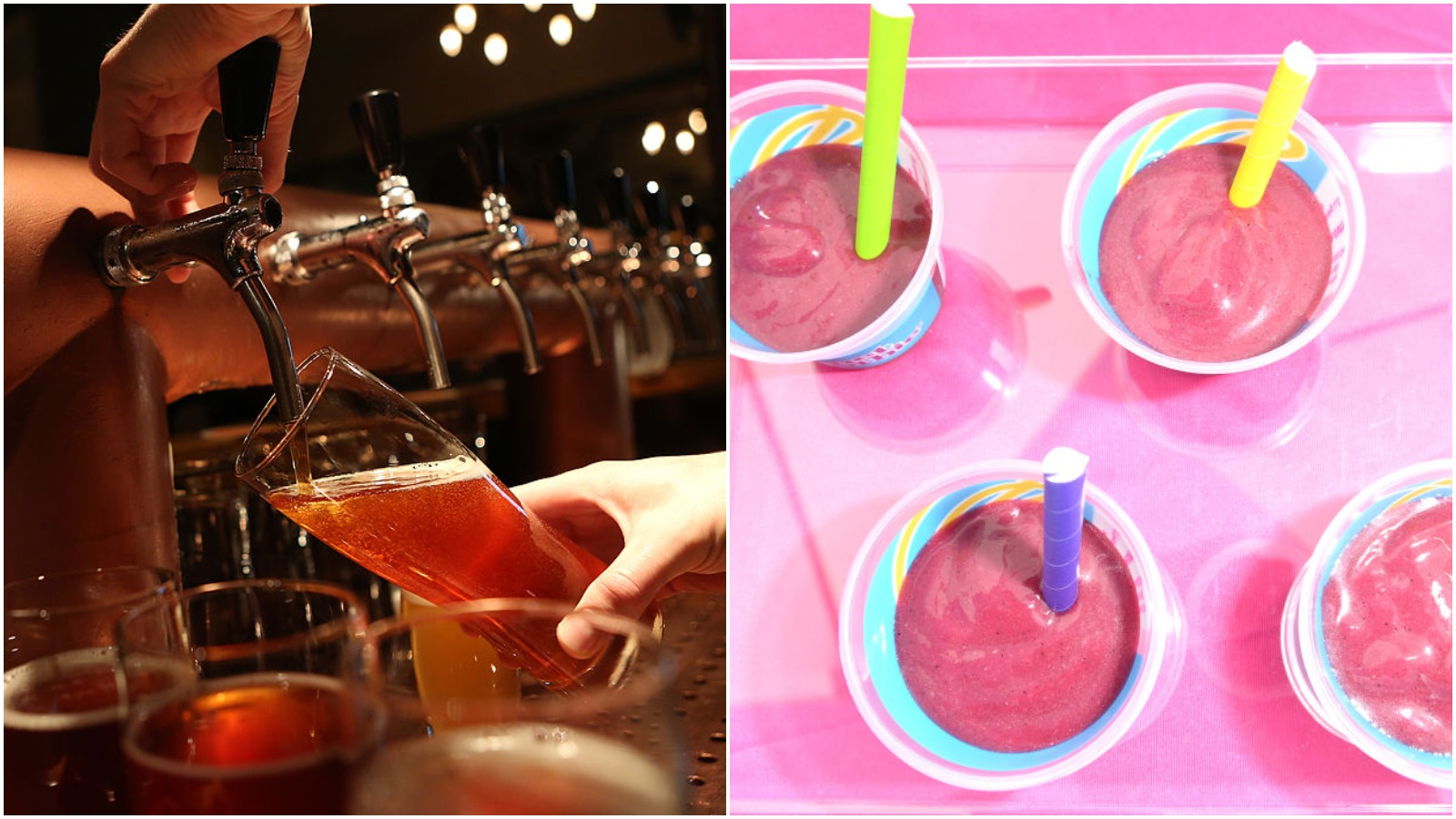Smoothie IPAs May Or May Not Actually Exist
Smoothie IPAs, sour IPAs, fruited IPAs, milkshake IPAs—it's a wild world out there, and brewers have opinions.
A few weeks ago, I gallivanted to a new-ish Chicago brewery in search of something easy-drinking and wheaty. I was met with a beer menu advertising SMOOTHIE-STYLE and MILKSHAKE-STYLE IPAs, both of which were conceptually new to me. I settled for a lager and spent the rest of the brewery trip wondering: when did beers begin this transformation into other drinks? Sure, I've had my fair share of coffee stouts, but smoothie beers? Milkshake beers? What does it all mean? To find out, I chatted with two industry experts about these heavily fruited concoctions.
What, exactly, is a smoothie IPA?
Short answer: no one really knows. "Since Smoothie IPA is an emerging category that hasn't yet been recognized as an official style by the Brewers Association, there's really no consensus on its definition," says Talia Shapiro, the content manager for Tavour, a craft beer delivery service. "The lines separating Smoothie IPA, Sour IPA, Fruited IPA, Milkshake IPA, Fruited Sour, and Slushy Sour are incredibly blurry." Shapiro went on to explain that some so-called "smoothie beers" taste like blended cocktails, while others taste like "full-on sundaes."
Okay, but if we had to agree on a definition?
Aaron Keefner, head of operations at Illinois-based More Brewing, tells me that a "smoothie beer" depends solely on a heavily fruited product loaded with purees and other adjuncts. "A smoothie beer is indeed just based on the amount of fruit in it and it having a similar taste to an actual smoothie," Keefner says, explaining that most breweries' "smoothie beers" are usually closer to a cloudy sour called a Berliner.
What are some examples of smoothie-style beers?
Keefner points me to More Brewing's "Frooted" line of smoothie-style ales, which are actually made of a wheat beer base that's been heavily fruited. "We also do a series of fruited sour ales that can tend to be what's called 'over-fruited' kettle sours and have a pretty thick body due to the amount of fruit used," Keefner says. Finally, he mentions More Brewing's "Marbles" line, a series of creamy milkshake IPAs that have the base grain of an IPA and a hop variation that enhances the fruit flavors.
Wait, what is a milkshake IPA?
Shapiro explains that, to some craft brewers, the "milkshake" IPA moniker is synonymous with smoothie IPAs, although others differentiate the two based on overall creaminess. "These beers must contain plenty of lactose," Shapiro says. "This milk sugar doesn't ferment, so it survives in sugar form, making the beer taste sweet. They often also contain vanilla for extra creaminess." As an example, Shapiro points to Great Notion Brewing's Orange Creamsicle IPA, which hit the scene all the way back in 2016.
How do brewers feel about the trend?
Here's where things get controversial. The Full Pint, a beer blog, says that milkshake and smoothie brews "go against everything a classically trained brewer was taught about brewing high quality craft beer." The blog reads:
"Keep in mind, by the standards of a classically trained brewer, unfiltered beers and chill haze are acceptable in certain styles. A beer that looks like egg drop soup, with visible chunks of hop and yeast matter, and has little-to-no head goes against this long-followed philosophy."
The brewing Reddit community is full of similar sentiments. "I always found the whole smoothie sours/IPA trend to be kind of dumb," writes one Redditor. "I mean after all they are like 50% fruit puree and mostly taste like pure fruit... now there is nothing wrong with a smoothie or fruit. But what value is the beer side bringing to the equation apart from alcohol? If the flavor is just all fruit then why even make it a beer?"
On that note, I'd be remiss if I didn't mention Smooj, a presumably putrid "hard seltzer smoothie" I discovered during my research. (Hat tip to Takeout contributor John Carruthers for sending that monstrosity my way.)
Keefner's feelings about smoothie beers aren't quite as inflammatory, although he does point out that they're not terribly popular within the More Brewing team. "Our brew team definitely prefers the fruited sour ale series to our Marbles or Frooted series," Keefner says. "Our brew team prefers fruited sours as it is a slightly more complex style to brew, and just hits our taste preferences more."
So, what's in a smoothie beer? It would seem that it depends on who you talk to. I probably won't venture into that realm given my beer palate, which is that of a middle-aged construction worker from central Pennsylvania. But it's nice to know that you can have your fruit and drink it, too.
